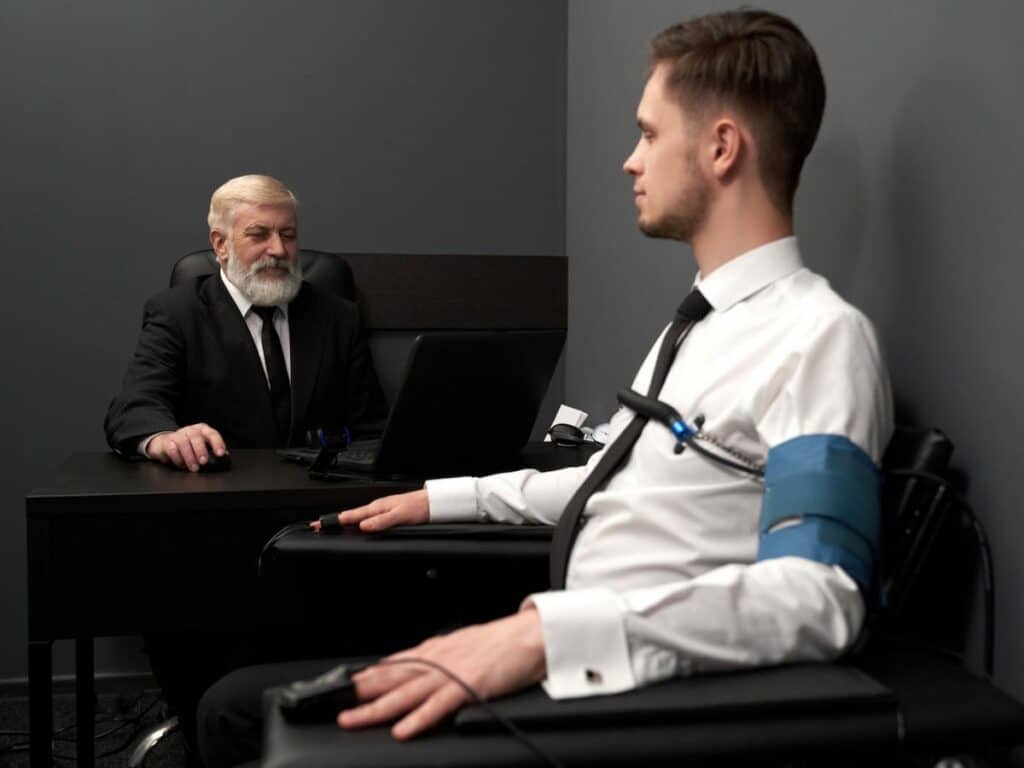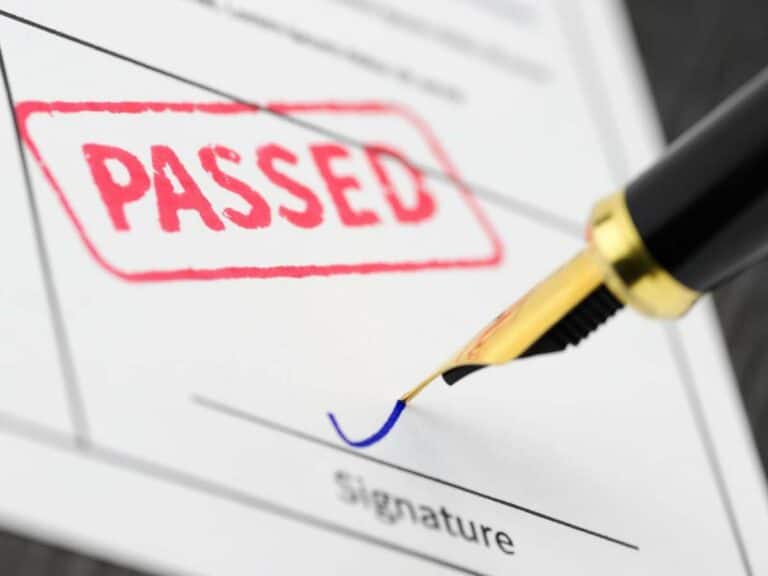Who Administers Polygraph Tests?
Polygraph examiners are the ones who administer polygraph tests. Also known as polygraphers or polygraphists, they are tasked not only with conducting lie detector tests but creating reports, too. Polygraph examiners also work closely with investigators and testify in court proceedings.
Read on to learn more about polygraph examiners. What are their roles? How did they become polygraphy experts? How much do they make per year?
Roles of a Polygraph Examiner

Contrary to popular belief, a polygraph examiner carries out many other tasks than just asking questions answerable by either a yes or no. There are various things that he or she needs to do before and after the in-test or chart collection phase, including analyzing the various recordings in order to produce a result.
With so many duties and responsibilities, it’s a must for the examiner to have the following:
- Analytical thinking skills
- Attention to detail
- Critical thinking skills
- Interpersonal communication skills
- Objectivity
- Organizational skills
- Self-confidence
It’s also important for any polygraph examiner to have excellent English and grammar skills. That’s because, in many instances, the reports they create become official court documentation and are kept on file for trials.
While examiners conducting a lie detector test are often pictured asking the examinee crime-related questions just like investigators in forensics crime drama TV shows, they are tasked with many other things, too. Some of the most critical of which happen behind the scenes, when the examinee is no longer around.
Let’s take a look at some of the most important roles of a polygraph examiner:
Prepare the examinee for testing
It’s during the pretest phase when the examinee is prepared by the polygraph examiner. Some of the tasks in this phase include completing the necessary paperwork and discussing to the examinee the lie detector test. Any question that the examinee may have can be asked and will be answered by the examiner.
Asking questions
There are three kinds of questions that a polygraph examiner asks the examinee: controlled, irrelevant and relevant. No matter the type of question, each one of them should be formulated very well according to the case. Roughly, the examiner asks a total of 10 questions — 3 to 4 of them are relevant or case- or crime-related ones.
Interpreting recordings
One of the most critical tasks of a polygraph examiner is collecting and analyzing the physiologic readings made by a lie detector machine. An examiner can choose from one or a combination of methods for chart scoring. No matter the method of choice, one can rest assured that it’s something that’s based on years of empirical work by experts.
Working with other professionals
Besides the person who is undergoing a lie detector test, there are others that a polygraph examiner has to interact with, too. Some of them include police officers and criminal investigators. It’s for this reason exactly why it’s a must for an examiner to have excellent interpersonal communication skills.
Testifying in court
It’s also not uncommon for a polygraph examiner to appear in court to testify. This is particularly true in states or jurisdictions where a lie detector test has admissibility. Where a polygraph is a valid pre-employment screening requirement, a polygraph examiner also usually meets with hiring managers.
Polygraph Examiner Salary
Based on the latest data provided by the US Bureau of Labor Statistics (BLS), the median salary of polygraph examiners in the US amounts to $61,930 per year. That’s equivalent to $29.78 per hour. The projected employment growth rate for examiners from 2021 to 2031 is 11%, which is higher than for most other occupations (8%).
The best-paid 25% of all lie detector test professionals in the country make $80,670 per year. The lowest-paid 25% of all examiners, on the other hand, make $47,750 per year.
Some of the top-earning polygraph examiners are employed in the following industries:
| INDUSTRY | ANNUAL SALARY |
| Federal executive branch | $114,220 |
| Local government | $68,480 |
| State government | $66,790 |
| Architectural, engineering and related services | $55,990 |
| Testing laboratories | $49,900 |
| Medical and diagnostic laboratories | $40,480 |
As of 2021, there are 17,600 individuals in the US working as polygraph examiners. The vast majority of them are males, making up approximately 84.1% of all polygraph technicians.
States with the most number of polygraph examiners employed are the following:
| STATE | EMPLOYMENT |
| California | 2,670 |
| Florida | 1,760 |
| Texas | 1,690 |
| Arizona | 910 |
| New York | 760 |
Becoming a Polygraph Examiner
Especially because it’s your reputation that’s on the line, it’s a must for the lie detector examination to be administered by someone who is suited for the job. He or she should have the necessary educational and professional qualifications, preferably with ample experience and credibility in the polygraph industry.
In some states, a polygraph examiner must be licensed to be able to provide his or her service legally.
And in order to obtain a license, the individual must complete an accredited program from an accredited school. There are instances where earning a related bachelor’s degree is a prerequisite.
Whether licensed or not because it’s not really a state requirement, it’s a must for the polygraph examiner to have had the necessary training. Although not really mandatory, being a member of a professional association is a huge plus. Having enough industry experience and using state-of-the-art equipment is also important.
Let’s check out the steps on how to become a polygraph examiner:
Attend a polygraph school
Just like when attending any other college or university, it’s a must to check that the polygraph school is accredited. It’s also important to make sure that the available programs are accredited.
If earning a bachelor’s degree is a requirement in the career path of choice, depending on the target governmental agency or specialization, it’s a good idea for the individual dreaming of becoming a lie detector expert to major in criminology, criminal justice, law enforcement, forensic science or any other closely related discipline.
Complete fieldwork or internship
Especially if the person plans on working as a polygraph examiner where being licensed is a must, he or she has to complete the necessary fieldwork or an internship. Because different examiners have different specializations, it’s important to choose to conduct research or undergo training that’s related to the preferred field.
Typically, someone who wants to work as a licensed examiner has to spend 1 to 2 years doing fieldwork or internship after successfully completing an accredited program.
Pass the licensing exam
Needless to say, it’s of utmost importance for the individual to take the licensing exam and pass it, too, if the state requires all polygraph technicians to be duly licensed.
The requirements for taking the licensing exam can vary from state to state. However, in most instances, completing the prescribed length of the internship is a requirement. The test, on the other hand, is usually the multiple-choice kind. Some states may require a polygraph examiner to undergo an oral exam or an interview.
Become a member of an association
One of the most popular professional associations for polygraph examiners in the US is the American Polygraph Association (APA). Different states, especially where a lie detector test may be admissible in court, have their own professional associations. For instance, Missouri has the Missouri Polygraph Association (MPA).
Affiliation with APA or a similar recognized association is not mandatory. However, it can give any client peace of mind that an examiner who is a member of one has to meet minimum standards in order to maintain membership.
Just Before You Put Your Trust in a Polygraph Examiner
Like many other professionals, a polygraph examiner is someone who has completed an academic program. Depending on the state, he or she should also have a professional license.
It’s not enough for the lie detector machine whose different sensors will be attached to your body to be sophisticated and in good working condition. It’s also a must for the examiner to be capable of administering the test proper and, more importantly, correctly evaluating the recordings in order to come up with an accurate verdict.
Related Questions
Where do polygraph examiners usually work?
Just like there are different polygraph specializations, there are also various industries where you can find a professional administering a lie detector exam. Some of them include law enforcement agencies, criminal investigative bodies, intelligence services and consulting firms.
Is being a polygraph examiner hard?
Being a polygraph examiner is hard because there are many different tasks that have to be carried out. Some of them before and during the exam, while others after the exam. It’s a must for the examiner to possess certain traits and skills to be able to provide the exam and come up with a report.
Read Next: What Happens After a Polygraph Test?






